Scholar Spotlight - Tito Mafikuyomi

Discover more Scholar Spotlights.
Tito Mafikuyomi, a Laidlaw Scholar at the University of Toronto, explores Barriers to Healthcare Access for Immigrant Women
Research Title:
Barriers to Healthcare Access for Immigrant Women in Castel Volturno, Italy: A Qualitative Exploration
This research investigates the challenges immigrant women face when accessing healthcare in Castel Volturno, a town with a large Nigerian migrant population. Through interviews with pregnant immigrant women, healthcare providers, and cultural mediators, the study explores systemic barriers such as racism, language obstacles, cultural differences, and lack of knowledge about available services. It also examines the impact of migration journeys on the health outcomes of these women, highlighting the intersection of social, cultural, and institutional factors.
Real-World Impact:
The findings aim to inform and improve healthcare delivery for immigrant communities by providing actionable insights for organizations like Emergency, an NGO that delivers healthcare services in Castel Volturno. By identifying and addressing specific barriers, this research has the potential to shape policies and practices that create more inclusive and accessible healthcare systems for migrant populations.
Moreover, the study contributes to a broader understanding of the unique challenges faced by immigrant women in accessing prenatal and maternal care. Its insights can inspire other healthcare providers and policymakers to prioritize cultural competency, language support, and anti-racism measures, fostering equitable healthcare for underserved communities globally.
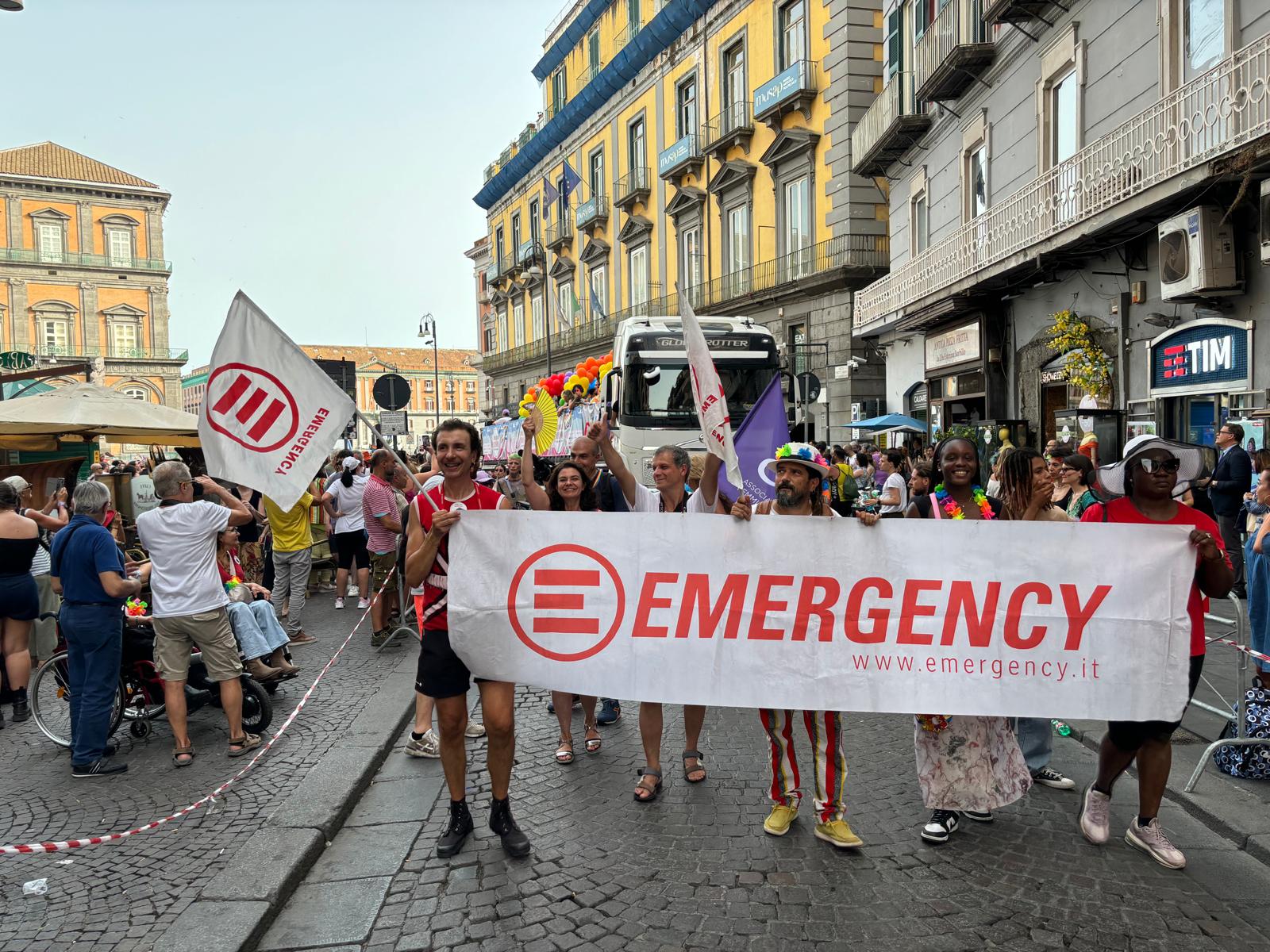
Parade representing Emergency
Where did your passion for this research originate?
My passion for this research originates from my identity as a Nigerian and my personal connection to immigrant communities. Growing up, I was acutely aware of the resilience required to navigate systems that often fail to accommodate cultural diversity and the lived realities of migrants. This awareness fueled my desire to understand and address the structural inequities that shape access to essential services like healthcare.
During my time in Castel Volturno, Italy, I witnessed the challenges faced by immigrant women, many of whom shared my Nigerian heritage. Listening to their stories—of perilous migration journeys, systemic racism, and cultural barriers—was both humbling and deeply personal. Sharing a cultural background with these women allowed me to build trust and create a safe space for them to share their experiences.
This research became an extension of my values: advocating for equity, dignity, and justice for marginalized communities. My identity and cultural understanding drive my commitment to amplifying these women’s voices and working toward actionable solutions that address their healthcare needs. This work is not just about research—it is about honoring the strength of immigrant women and striving to create systems that truly support them.
What is the most memorable moment from your Laidlaw scholarship experience so far?
A memorable moment from my Laidlaw scholarship was the first meeting where we shared our leadership experiences. We spoke about our impact through NGOs, self-directed projects, and centrally offered initiatives. Hearing the diverse ways my fellow scholars were driving change around the world was deeply inspiring. It was eye-opening to see how each of us, despite working in different areas, was united by a shared purpose of creating meaningful change. I felt motivated knowing I was part of a community making a global impact. This experience reminded me of the collective power of leadership and collaboration, and the importance of drawing on diverse experiences to achieve common goals.
What is the biggest challenge you came across in your research and leadership journeys so far, and what did you learn from it?
The biggest challenge I faced in my research was managing the emotional weight of the stories shared by immigrant women in Castel Volturno, Italy. Hearing about their dangerous journey from Nigeria to Libya, and by boat to Italy—enduring days without food and physical abuse—was heartbreaking. Balancing this emotional impact with my research role required focus and empathy. I learned the importance of emotional resilience and how to create a respectful, supportive environment for participants. This experience strengthened my commitment to using research as a tool for systemic change while honoring the personal stories that shape it.
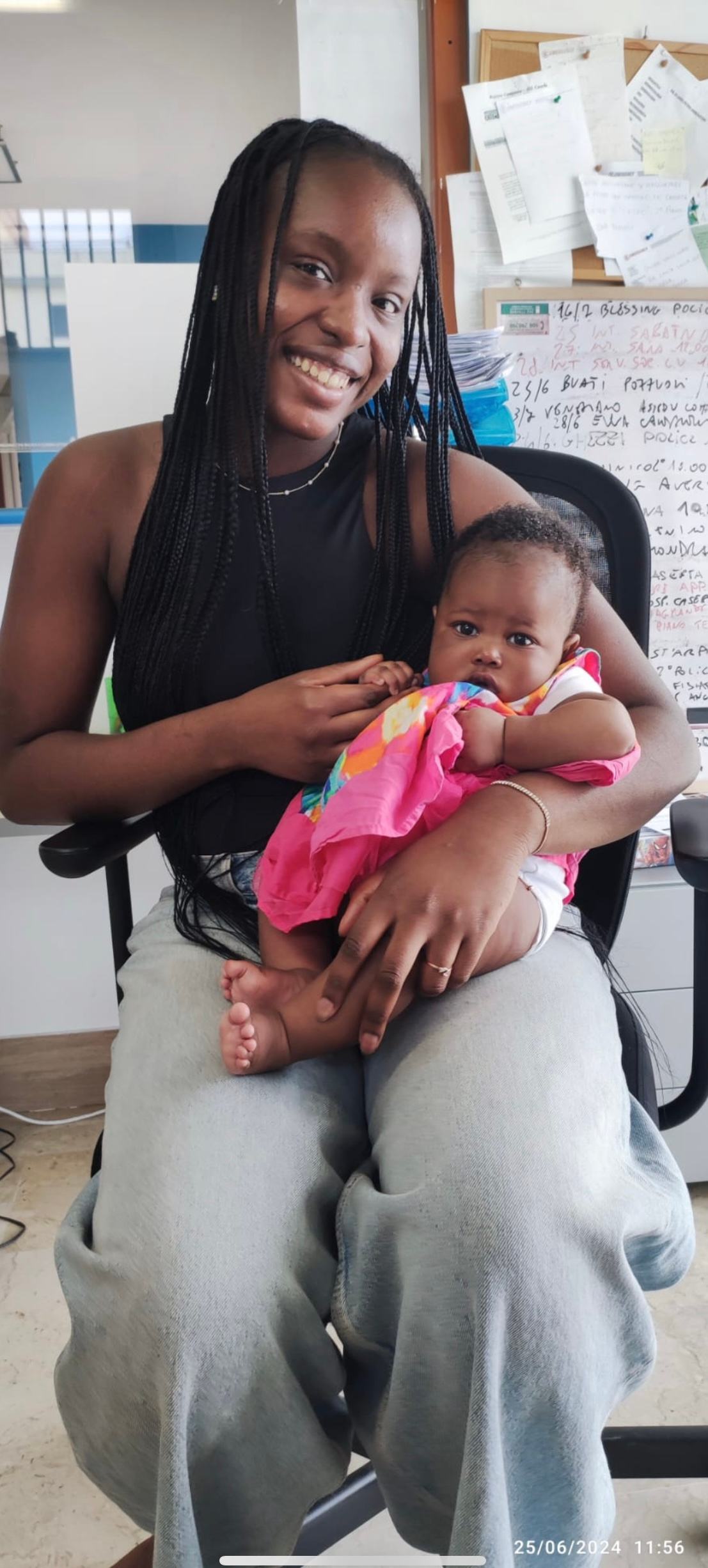
Tito and a lovely baby from Castel Volturno that came to visit emergency
What does it mean for you to be a Laidlaw Scholar?
Being a Laidlaw Scholar means having the opportunity to contribute to meaningful, real-world change through research and leadership. It’s a recognition of the commitment I’ve made to tackling complex challenges and addressing issues that matter to underserved communities. The program empowers me to explore my passions, connect with like-minded peers, and be part of a global community working toward equity and positive impact. It also holds me accountable to lead with integrity, empathy, and a deep sense of responsibility toward those whose voices are often overlooked. The Laidlaw experience is not just about academic growth—it’s about using that knowledge to make a tangible difference. Being a Laidlaw Scholar means I’m part of a movement that values action alongside learning and believes in the transformative power of leadership to create a more just and inclusive world.
Which particular leaders inspire you the most and why?
One leader who deeply inspires me is Ngozi Okonjo-Iweala. Her leadership journey is a testament to resilience, excellence, and breaking barriers. As the first woman and African to lead the World Trade Organization (WTO), Okonjo-Iweala has proven that leadership is not just about authority but about using one’s position to create lasting, positive change. Her career as Nigeria’s Finance Minister and her work with the World Bank have showcased her expertise in economics, her commitment to poverty reduction, and her relentless fight against corruption.
In addition to Okonjo-Iweala, my parents have had an immense impact on me. They taught me the value of hard work, integrity, and the importance of community. Growing up, I saw firsthand how they navigated challenges with resilience and always prioritized helping others, even in difficult circumstances. Their commitment to making a positive impact in the lives of those around them continues to inspire me daily. Their leadership, grounded in compassion and selflessness, influences my approach to both my work and my goals.
Briefly describe a scene from the future you are striving to create.
I envision a future where Black women have equal access to high-quality healthcare, where their voices are heard, and their unique needs are understood and prioritized. In this future, systemic racism no longer influences healthcare outcomes, and Black women are not disproportionately affected by maternal mortality or other health disparities. Medical professionals will be trained in cultural competency, ensuring that every patient is treated with respect, dignity, and empathy. Healthcare spaces will be inclusive, diverse, and free from bias, where Black women can access preventative care, mental health support, and treatment without fear of discrimination. Policies will be rooted in equity, ensuring that Black women not only survive but thrive. This future will see a healthcare system that values Black lives, creates safe spaces for Black women, and works tirelessly to eliminate the racial inequities that have plagued healthcare for far too long.
Quick-fire Questions
📺 Currently Binging:

📚 My top book recommendation:
Stay with me - Ayobami Adebayo

🎶 My anthem:
-
🎧 Current Podcast Obsession:

🌈 Something that made me feel joy recently:
I learnt how to make my favorite desert Tiramisu and now I can make it from scratch any time I want!
If you're interested in the work I do or want to engage with topics around healthcare equity, mental health, and social justice, feel free to connect with me through my social media or follow my ongoing projects. I'm currently working on a research project focused on improving healthcare access for immigrant women, especially in marginalized communities. I’m passionate about advocating for equitable healthcare systems, and you can stay updated on my progress and thoughts by following me on www.linkedin.com/in/boluwatitomafikuyomi
If you want to learn more about Tito's work, explore her research here and follow her on LinkedIn. Tito Mafikuyomi is a Laidlaw Undergraduate Leadership and Research Scholar at the @University of Toronto. Become a Laidlaw Scholar to conduct a research project of your choice, develop your leadership skills, and join a global community of changemakers from world-leading universities.
Find out more about the Laidlaw Scholars Undergraduate Leadership and Research Programme.
🔦 Discover more Scholar Spotlights:
⚡️ Anuj (AJ) Manchanda, a Laidlaw Scholar at the University of Toronto, delves into how Environmental CSR initiatives shape consumer choices.
⚡️ Sebastian Glasper, a Laidlaw Scholar at the University of Leeds, explores social media’s role in mitigating loneliness among older adults.
⚡️ Sophia Waseem Khan, a Laidlaw Scholar at Durham University, champions sustainable agriculture through innovative ion recovery.

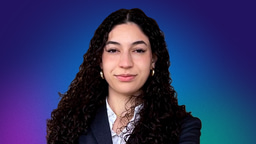

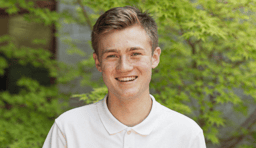

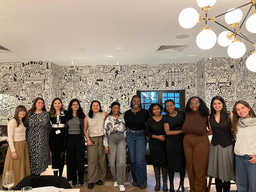
Please sign in
If you are a registered user on Laidlaw Scholars Network, please sign in